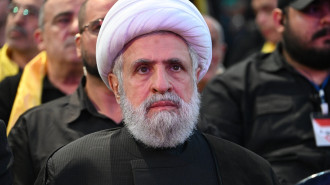![Cyprus has been divided into a Greek south and Turkish north ever since the brief but devastating invasion of 1974. [Getty]](/sites/default/files/styles/image_360x240/public/2021-07/GettyImages-652354910.jpg?h=c3d30cf3&itok=5D6Qdw-o)
Old wounds, new divides: Erdogan's heavy hand in Cyprus
![Cyprus has been divided into a Greek south and Turkish north ever since the brief but devastating invasion of 1974. [Getty]](/sites/default/files/styles/image_360x240/public/2021-07/GettyImages-652354910.jpg?h=c3d30cf3&itok=5D6Qdw-o)
With President Recep Tayyip Erdogan projecting his vision for a ‘New Turkey’, Ankara’s policies over the past few years in the Eastern Mediterranean and Cyprus have revived old animosities and disputes.
The president’s recent visit to the self-declared Turkish Republic of North Cyprus (TRNC) not only serves to renew old and perennial troubles but also appears to be magnifying them.
Alongside a reinforced claim that the Cyprus dispute can only be resolved through a two-state solution, which would further divide the island’s communities, Erdogan’s visit also revealed Turkey’s aspirations regarding the international status of the TRNC, a territory only recognised by Ankara.
Furthermore, the visit to commemorate the 47th anniversary of the Turkish invasion of the island came shortly after failed peace talks in April, which highlighted the challenges the peace process faces under such polarised circumstances.
"Alongside the claim that the Cyprus dispute can only be resolved through a two-state solution, Erdogan's visit also revealed Turkey's aspirations regarding the international status of the TRNC, a territory only recognised by Ankara"
Two-state solution
The message sent by the Turkish government to the international community in recent months has been straightforward: peace talks on Cyprus can only resume on the basis of a two-state solution.
From Turkish ministers to state secretaries and the president, the Turkish government has openly pushed this political rhetoric, emphasising elements dividing the Greek and Turkish Cypriot communities and highlighting repeated failed negotiations based on the previous model - a bizonal, bicommunal united federation.
This open push for the two-state solution model has come alongside a boost for the TRNC’s state structures, mainly focusing on the improvement of infrastructure in north Cyprus and in strengthening the TRNC presidency.
During his visit, for example, Erdogan emphasised the need for the construction of new state buildings, such as a presidential palace for President Ersin Tatar, as well as the construction of a new parliament.
|
|
Alongside these announcements, there is a larger project underway by which the Turkish government is willing to modernise and upgrade strategic infrastructure in the TRNC, such as highways and airports.
Furthermore, the Turkish government and the Turkish Cypriot leadership have announced that they will reopen the ghost town of Varosha, abandoned since Turkey’s 1974 military invasion and a key dispute in the peace process ever since.
The announcement, together with plans to authorise new Turkish settlers in Varosha, has angered the Greek Cypriot government as well as the EU and would violate UN resolutions regarding its status.
The Turkish invasion in 1974 displaced more than 150,000 Greek-Cypriots, who were forced to abandon their homes in the north.
By developing these infrastructure projects financed and supported by Ankara, the TRNC is attempting to gain credibility as a state vis-à-vis its own citizens, Turkish society, and, ultimately, boost its legitimacy in the international arena.
More importantly, Ankara-financed infrastructure projects make the Turkish government the sole investor in the TRNC and render other investment projects by international stakeholders in north Cyprus, intended to bring communities together, practically irrelevant.
This projected new Turkish Cypriot state by Turkey also requires an obedient leadership that is subservient to Ankara’s demands.
As a result, the status of Ersin Tatar, the current TRNC president elected in October last year and openly supported by Erdogan, has been boosted with similar methods used by Ankara’s presidential office.
Tatar’s social media profiles have been incredibly active since becoming president, sharing and publishing videos and pictures in the same way Erdogan and his team have been doing for years.
"Ankara-financed infrastructure projects make the Turkish government the sole investor in the TRNC and render other international projects in north Cyprus, intended to bring communities together, practically irrelevant"
Moreover, Tatar has been invited to different international events and conferences in Turkey in an attempt to boost his international profile.
Mete Hatay, a senior researcher at the Peace Research Institute Oslo (PRIO), told The New Arab that there are limits to Ankara’s plans regarding international recognition of the TRNC.
“Erdogan did not announce any direct flights from north Cyprus to Baku,” he said, despite the expectation of raising north Cyprus’ international recognition during his visit.
Instead, “he announced the construction of a new parliament and a new presidential palace in north Nicosia,” Hatay added.
Bringing back old political ghosts
“The owner of the Cyprus cause is the whole great Turkish nation. The owners of this cause are also our martyrs and veterans,” Erdogan said during his speech last week at the Turkish Cypriot parliament, adding, “Greek Cypriots have never seen the Turkish Cypriots as equal partners”.
Both the Turkish and Turkish Cypriot ruling elite have also attempted to revive the memory of political figures such as Rauf Denktas, the founding father of the TRNC and a staunch nationalist.
|
|
By glorifying and exalting this figure, both the Turkish government and the TRNC are trying to ensure that the partition of the island into two entities is the only solution on the negotiating table.
Interestingly, Denktas had been ousted during the final years of his political career by Erdogan, who saw him as an obstacle to Turkey’s aspirations to joining the EU during the early 2000s. But since 2015, the Turkish government has solidly moved into the nationalist camp, where the Cyprus issue plays a key role.
“Part of this visit and the announcements made by Erdogan were directed to his constituency and to please his government allies in the MHP,” Hatay says, a far-right ultranationalist Turkish party whose support Erdogan needs.
Within this context, Erdogan appears as the sole protector of Turkish and Turkish Cypriot interests in Cyprus and in a hostile Eastern Mediterranean region, while at the same time attempting to halt his plummeting popularity back in Turkey.
"By developing infrastructure projects financed and supported by Ankara, the TRNC is attempting to gain credibility as a state vis-à-vis its own citizens, Turkish society, and, ultimately, in the international arena"
From a regional perspective, Greece and the Republic of Cyprus have labelled Erdogan’s visit to north Cyprus as a new provocation and threat to the peace process, adding tension to already fragile EU-Turkey relations and further polarising the geopolitical scene in the Eastern Mediterranean.
A bigger presence for Turkey in north Cyprus, whether military, financial, or political, is likely to further complicate restarting the much-needed dialogue between the Greek and Turkish Cypriot communities to attain a new consensus.
“Nowadays, the atmosphere is not suitable for restarting a new peace process in Cyprus, the island is very polarised,” Hatay says. According to the researcher, a recent announcement by President of Cyprus Nikos Anastasiadis for plans to strip Turkish Cypriots of their Cypriot citizenship due to their political views only adds to the tensions.
Such policies show the waning interest of the Greek Cypriot government in resuming peace talks, with officials appearing to be hiding behind their new regional allies.
Although the current situation in the Eastern Mediterranean is not as tense as it was last year, the region remains highly volatile and exposed to unpredictable trends that can rapidly escalate into hostile actions between competitors, where the race for control of natural gas underwater resources remains a key trigger for conflict.
The words and actions of Ankara in north Cyprus only serve to magnify and revive this old conflict, adding further layers to an already complicated peace process while at the same time sustaining high levels of polarisation in the Eastern Mediterranean region.
Xavier Palacios is a freelance political risk analyst based in Nicosia, Cyprus. His work as a researcher and analyst focuses on South-East Europe and the Eastern Mediterranean, with a special interest in Turkish politics, history and culture.
Follow him on Twitter: @palaciosmengod






 Follow the Middle East's top stories in English at The New Arab on Google News
Follow the Middle East's top stories in English at The New Arab on Google News


